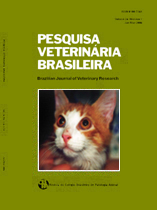 |
|
|
|
Year 2010 - Volume 30, Number 2
|

|
Canine distemper virus detection in asymptomatic and non vaccinated dogs, 30(2):139-144
|
ABSTRACT.- Del Puerto H.L., Vasconcelos A.C., Moro L., Alves F., Braz G.F. & Martins A.S. 2010. Canine distemper virus detection in asymptomatic and non vaccinated dogs. Pesquisa Veterinária Brasileira 30(2):139-144. Departamento de Patologia Geral, Instituto de Ciências Biológicas, Universidade Federal de Minas Gerais, Campus Pampulha, Belo Horizonte, MG 31270-901, Brazil. E-mail: helendelpuerto@hotmail.com
A quantitative real time polymerase chain reaction (PCR) revealed canine distemper virus presence in peripheral blood samples from asymptomatic and non vaccinated dogs. Samples from eleven domestic dogs with no signs of canine distemper and not vaccinated at the month of collection were used. Canine distemper virus vaccine samples in VERO cells were used as positive controls. RNA was isolated with Trizol®, and treated with a TURBO DNA-free kit. Primers were designed for canine distemper virus nucleocapsid protein coding region fragment amplification (84 bp). Canine b-actin (93 bp) was utilized as the endogenous control for normalization. Quantitative results of real time PCR generated by ABI Prism 7000 SDS Software showed that 54.5% of dogs with asymptomatic canine distemper were positive for canine distemper virus. Dissociation curves confirmed the specificity of the real time PCR fragments. This technique could detect even a few copies of viral RNA and identificate subclinically infected dogs providing accurate diagnosis of this disease at an early stage. |
| |
|
|
| |
|
 |